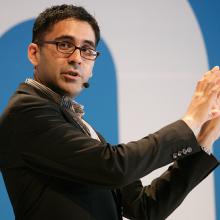Revolution
Daniel José Older’s novel is a powerful meditation on love and betrayal in times of revolution.

Image via View Apart/Shutterstock.com
I looked at the list of opportunities. New neighbor volunteers. Resettlement service volunteers. Adult literacy training. My introverted heart fluttered inside of me, wanting to help, and yet so aware of its own limitations.
In the end, I chose to work in the Refugee donation center. It felt like a cop-out, a suburban, guilt-assuaging kind of “volunteering” that had nothing to do with social justice or Kingdom work or the irresistible revolution.
And yet, perhaps, that’s not true. Perhaps the pursuit of justice is not something that requires me to sacrifice my introverted soul – but rather to lean into it.
Kranti is Hindi for "revolution." Indeed, this extraordinary organization is working to erase the heavy labels that come with being born, raised, and even trafficked in Kamathipura. Laal Batti Express ("Red Light Express") is a three-segment depiction of the girl’s delightful and dark stories, of which each performer was asked to add three.
"We call the girls revolutionaries," Robin said.

Photo via sakhorn / Shutterstock
I HEAR A STIRRING, a rumbling. An awakening. Sometimes the sound is so faint, I worry it’s my imagination, my optimism getting the best of me. I pause, listen, and wait. Here it comes again. I want to rush to my window, fling it open, stick my head way out, and look around. Is it happening? For real this time? Is the sleeping giant finally waking up?
God knows we’ve slept too long.
Many of us—myself included—slept through a revolution. Actually, it was a counterrevolution that has blown back much of the progress that so many racial justice advocates risked their lives for. This counterrevolution occurred with barely a whimper of protest, even as a war was declared, one that purported to be aimed at “drugs.”
Really, the war took aim at people—overwhelmingly poor people and people of color—who were taken prisoner en masse and then relegated to a permanent, second-class status, stripped of basic civil and human rights such as the right to vote, the right to serve on juries, and the right to be free from legal discrimination in employment, housing, and access to education and public benefits. Branded “criminals” or “felons,” millions of people discovered that the very rights supposedly won in the civil rights movement no longer applied to them.
THE PHRASE “a revolution of rising expectations” is now part of the social science literature. When people who are not oppressed have a belief that life is getting better as economies improve, their expectations often outstrip the pace of actual change. Those rising expectations lead to unrest as demands for improvement continue to grow.
This summer we have seen that play out in several countries. As living standards increase, people are less likely to tolerate corrupt and inefficient governments. Washington Post reporters Anthony Faiola and Paula Moura recently wrote, “One small incident has ignited the fuse in societies that, linked by social media and years of improved living standards across the developing world, are now demanding more from their democracies and governments.”
In Turkey, it was the government’s plans to destroy the only public green space in the heart of Istanbul, a park that was to be replaced with a shopping mall. Protests against the plan soon grew into broader concerns about what is seen as increasingly authoritarian rule by Prime Minister Recep Tayyip Erdogan. They turned violent when peaceful demonstrators were attacked by police, and ultimately an Istanbul court ruled against the plan, although it is not finally settled.
In Brazil, protests that began over a proposed rise in bus fares brought hundreds of thousands of people into the streets. The protests soon escalated into opposition to the large amounts of money the government is investing in facilities for the 2014 World Cup and the 2016 Olympics, while neglecting basic health care and education. President Dilma Rousseff has promised political reforms and increased spending on public transportation and other social needs.
WHEN CECIL WILLIAMS was 8 years old, he imagined murdering a police officer. It’s a jarring way for an influential minister to begin a memoir about radical hope and perseverance. But in a short lifetime of intense oppression, Williams had already internalized heartbreaking lessons of systemic injustice and the righteously violent tendencies that can follow. The budding young leader already nicknamed “Rev” and wise beyond his years also knew that if he could imagine brutality, he could envision a transformed society.
“Imagination is one of the most penetrating and incendiary forces I’ve ever experienced,” he writes in Beyond the Possible: 50 Years of Creating Radical Change at a Community Called Glide, co-authored with his wife and longtime collaborator, Janice Mirikitani. Building on their shared vision over a remarkable half-century, they lead what might be the most exuberant congregation in America. Glide Memorial United Methodist Church and the Glide Foundation are inextricable, legendary San Francisco institutions, the latter one of the city’s largest social service providers and the real-life shelter featured in the 2006 biopic The Pursuit of Happyness.
Writer Dave Eggers sums up Glide in the book’s introduction with a simple but uncomfortable truth: There are very few places in society where someone is not left out. Houses of worship are supposed to make a dream of inclusivity possible, but even the most inspiring visionaries live and lead imperfectly. Eggers proposes that because of the unconditional love necessary for a lasting marriage between two seemingly incompatible leaders—Williams, a black Texas minister with a solid upbringing, and Mirikitani, an agnostic Japanese-American poet from a broken, abusive home—Glide is one of the few radically accepting places where true unconditional love is practiced like the most dogmatic of faiths.
THE 2011 REVOLUTION that led to the ouster of Egyptian President Hosni Mubarak signaled hope and liberation for the people of Egypt. But many Egyptians and others fear that President Mohamed Morsi, in his actions to consolidate power and quell opposition, has become “Mubarak with a beard.”
Sen. Ehab El Kharrat, a psychiatrist and Christian member of the Shura Council, Egypt’s upper house of Parliament, still looks to his country’s future with hope. Kharrat talked with Mary Theresa Webb early this year while the senator was in Washington, D.C., for the National Prayer Breakfast. Webb is the founder of the GOAL Project, a U.S.-based organization that provides addiction recovery training for churches and communities around the world, including Egypt.
—The Editors
Mary Theresa Webb: You are one of three Christians elected to the Egyptian Parliament. Could you describe why you decided to run for office? How does your Christian faith influence your work?
Ehab El Kharrat: I was elected by both Muslims and Christians to serve the whole people. I stand for love and freedom, and I think these are the things my savior and Lord Jesus stood for. My political involvement is not about the rights of the Christian minority in Egypt, but about the rights and dignity of all.
We on the Shura Council have received threats from violent groups, Muslim extremists, and the secularist terrorist group called the Black Bloc, who wear black masks and defend secular protesters with violence. I once stood up in a human rights session and said that I may be threatened and killed, but I will not accept the Black Bloc members’ violence and pledged all to refrain from such violence. If I die, I die. But I want to keep our revolution peaceful.
I like to think that the spirit of Christ is the spirit of justice, freedom, and love. One of my heroes, Charles Grandison Finney, the 19th-century New England theologian and revivalist, said [paraphrase], “Revolution is inevitable if the virtue or wisdom of the people exceeds that of its rulers, or if the vice and ignorance of the people exceeds that of its rulers.” I like to think that the first half of his statement applies to the Egyptian revolution.
Religious historians say that every 500 years, Christianity goes through a “massive transition,” as noted religion writer Phyllis Tickle puts it.
Around 500 A.D., “barbarians” sought to subjugate Rome by wiping out its underlying religion. Christianity went underground. In abbeys like Iona, monks painstakingly copied Scripture and civilization’s great writings, in effect saving Western civilization itself.
Around 1000 A.D. came the “Great Schism,” when the Western church based in Rome and the Eastern church based in Constantinople fought over creeds and doctrine, political power and cultural hegemony. That split endures to this day between Eastern Orthodoxy and Catholicism.
Around 1500 A.D. came the Protestant Reformation, when nationalism born of exploration in the New World and new commercial wealth demanded an end to Rome’s domination of European life. That split, too, endures.
Now comes a new millennium, and Christianity wears so many different faces that it’s difficult to speak of a single “Christian movement.”

Umair Haque speaking at the 2009 NEXT conference in Berlin. Via Wylio http://bit.ly/AugRQB
If you’re on Twitter, you may well have a few people that you follow with such enthusiasm that it occasionally feels a little like you’re stalking them. You re-tweet every article they post, nod along with every inspiring tweet they type and include them in your Follow Friday list every week.
Even if that’s not true for you, it’s certainly true for me of one person in particular — Umair Haque.
Haque is a self-titled “author, blogger, thinker, reformer.” But the more I read of his work, the more inclined I am to add the title “prophet” to that list of descriptors.
Haque is a prophet in the sense that he is preaching a message that is for a specific group of people (those who are disenfranchised but not quite cynical enough to give up yet) at a specific point in time (now, in a time of economic malaise). His words cut right to the heart of what has been going wrong in our world, and they are words that many, many people need to hear.
So it was with great relish that I purchased his new digital book, Betterness: Economics for Humans, excited to hear these words.



